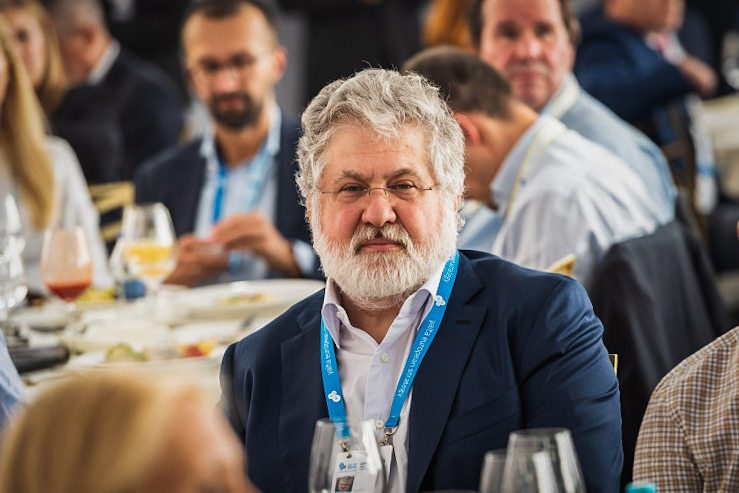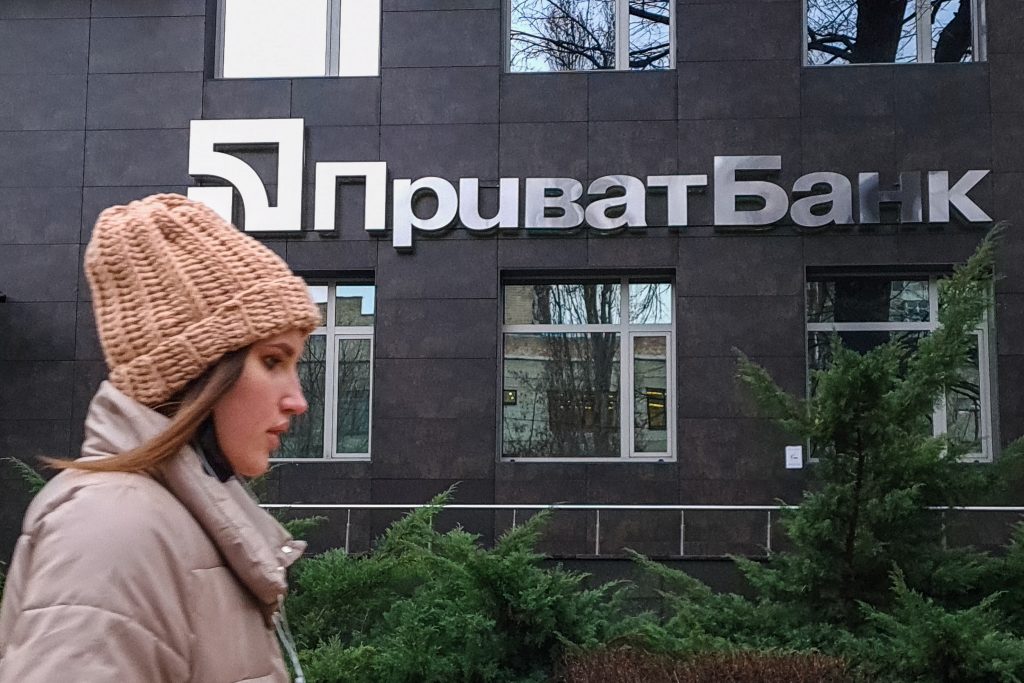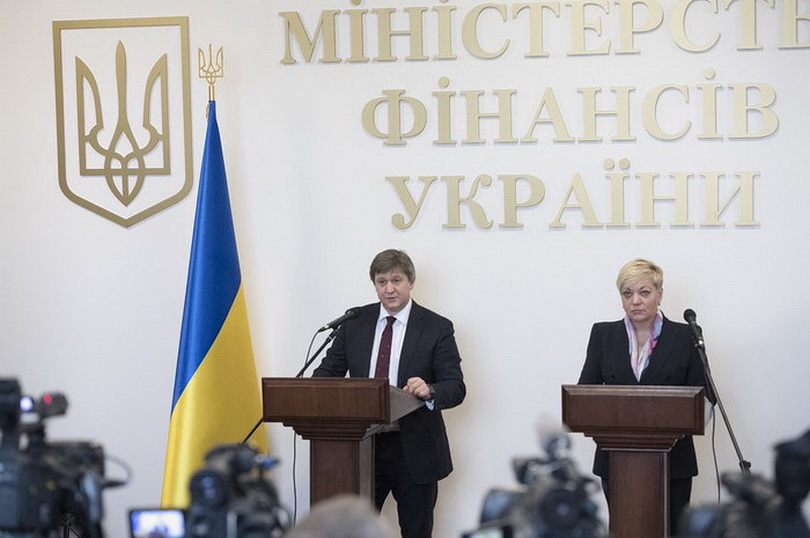Five years ago, as Ukrainians prepared for Christmas celebrations, state officials were working late, trying to rescue the country’s financial system from collapse.
The largest and most profitable commercial bank in Ukraine, PrivatBank, was about to go bankrupt.
Auditors discovered that the oligarchs who owned the bank, Ihor Kolomoisky and Gennadiy Boholyubov, were using depositors’ money to grant loans to themselves, their partners and friends, and never paid them back. According to the auditors, this Ponzi-like scheme was running for almost a decade. The two oligarchs deny this.
When officials of Ukraine’s National Bank uncovered the fraud, they asked Kolomoisky and Boholyubov to replenish the bank’s capital, but the bank’s owners failed to do so.
On Dec. 16, 2016, the two oligarchs sent a letter to then-Prime Minister Volodymyr Groysman asking the Cabinet of Ministers to buy the bank.
Three days later, PrivatBank officially came under state control. The government paid 1 hryvnia ($0.04) for 100% of the bank’s shares and immediately injected $5.5 billion to save it from falling apart.
The oligarchs and the state subsequently squared off in an epic legal battle that still spans five countries. Kolomoisky and Boholyubov want the bank back. The government wants to recover the missing $5.5 billion, allegedly embezzled through Cyprus and parked overseas.
While local courts have tended to side with the two oligarchs, foreign ones have mostly ruled in favor of Ukraine’s government.
Despite these challenges, the now state-owned PrivatBank has managed to return to being the country’s most profitable banking institution, with plans for its future privatization under discussion in government.
As we mark the fifth anniversary of PrivatBank’s nationalization, the Kyiv Independent goes over five key events that shaped its story.
#1: Asset Freeze
In December 2017, the High Court of London imposed a worldwide freeze on $2.5 billion of assets owned by Kolomoisky and Boholyubov and set a weekly limit of 20,000 pounds for their expenses.
The move came days after state-owned PrivatBank sued its former owners for over $1.9 billion which they allegedly embezzled from the bank through six British firms, plus interest of $500,000 per day.
The oligarchs tried to lift the freeze by claiming that the London court did not have jurisdiction to make such a decision. Even though Boholyubov has British citizenship, the two businessmen argued that they do not live in the United Kingdom and that the case should be tried in Ukraine or Switzerland, where they resided at the time.

Despite calling it a “good arguable case” and saying fraud “on a vast scale” took place, the judge at the High Court of London dropped the case. In December 2018, the court sided with Kolomoisky and Boholyubov and dismissed PrivatBank’s claim, citing the lack of jurisdiction.
The bank successfully appealed. In October 2019, England’s Court of Appeal ruled that PrivatBank can proceed with the claim against the “epic” fraud it endured. The hearings are scheduled for March 2022.
The worldwide asset freeze remains in place for Kolomoisky and Boholyubov until the final decision of the London court.
#2: Kolomoisky’s legal battles
During the initial years following PrivatBank’s nationalization, Ukrainian courts tended to side with the former owners, with the two oligarchs and their allies managing to win several key cases.
On April 18, 2019, the controversial Kyiv District Administrative Court issued two separate decisions in Kolomoisky’s favor. First, it ruled that the nationalization of PrivatBank was illegal. Second, it invalidated a list compiled by Ukraine’s central bank which contained all the parties allegedly related to Kolomoisky and his PrivatBank schemes.
People and entities on this list had their deposits in PrivatBank forcibly converted into capital by the state. At least 29 billion hryvnias ($1.16 billion) were bailed in.
The three dozen associates on the list include brothers Ihor and Hrihoriy Surkis, who are both business partners of Kolomoisky. They fought to reclaim their deposits.
In 2017, the Surkises won a lawsuit in Kyiv’s Pechersk District Court which ordered PrivatBank to pay them back $350 million.
Multiple officials said that the Pechersk court made this decision before ruling on the merits of the case, which is illegal.
After a long legal battle, in September 2021 the Supreme Court returned the case to the first instance court, which PrivatBank sees as a victory.
The bank won another case on Dec. 14, when the Sixth Court of Appeal overturned the administrative court’s second decision, reviving the validity of the list of parties related to Kolomoisky.
#3: Israel going after oligarchs
The bank also went after the oligarch in Israel, where he has citizenship. In December 2019, it sued Kolomoisky in Tel Aviv for the $600 million he allegedly transferred into the Israeli Discount Bank through shell companies.
The accounts are registered by a U.S. Virgin Islands shell company allegedly controlled by the two oligarchs. The bank claimed that the transfers were made through the Cyprus branch from 2007 through 2011.
The case has been stalled for two years due to respondents allegedly dodging complaints.
The Tel Aviv claim also accuses Kolomoisky and Boholyubov of fraud and embezzlement, also naming the Israeli Discount Bank as a defendant in the complaint, accusing it of aiding the alleged scheme.
In August, the bank prevented Kolomoisky, Boholyubov, and their associate Vyacheslav Kartashov from dodging the lawsuit by publishing the summons in the state-owned Voice of Ukraine newspaper. This gave the defendants 60 days to respond, which they didn’t do, before the case proceeded automatically.
In July, Israeli police opened a fraud investigation allegedly involving Kolomoisky and his associates, according to a Kyiv Post report quoting an unnamed source. This case does not appear to be related to PrivatBank -- rather it involves the oligarch's dealings with Ukrainian state energy company Centrenergo.
#4: Ukraine charges former top managers of PrivatBank
In March 2021, the National Anti-Corruption Bureau (NABU) charged five former PrivatBank managers with embezzlement.
These were the first criminal cases brought against anyone allegedly involved in the insider lending and money laundering schemes.
One of the suspects, former PrivatBank deputy CEO Volodymyr Yatsenko, had his plane ordered to land by authorities minutes before it would have left Ukrainian air space.
Yatsenko later denied that he was trying to run away. However, he went straight to the airport immediately after charges against him were signed, meaning someone in the Prosecutor General’s office may have tipped him off. Law enforcement had to spectacularly ground his private plane to hand him the notice of suspicion.
The High Anti-Corruption Court later released Yatsenko on bail of Hr 52 million ($1.9 million). He must remain in Dnipropetrovsk Oblast, where he has a house, and wear an electronic bracelet.
Other suspects charged in the case include PrivatBank’s former CEO Oleksandr Dubilet, who lives in Israel, and the head of the financial management department, Olena Bychikhina. They were accused of stealing Hr 136 million ($5 million) from the bank.
The sum went missing on Dec. 16, 2016, the date of PrivatBank’s request to be nationalized. It ended up in the account of Ingosstrakh, an insurance company that Yatsenko and Dubilet control through other shareholders. Bychikhina simultaneously worked at PrivatBank and Ingosstrakh at the time of the transfer.
According to investigators, the transfers were masked as deposit payments. To make them look legitimate, the trio backdated the documents.

This was not the only alleged embezzlement of funds out of the bank by its management during the nationalization.
One day before the state took control of PrivatBank, another $315 million disappeared from its accounts.
The NABU suspects Dubilet and his subordinates – Liudmylla Shmalchenko, former deputy chair of PrivatBank, and Nadiya Konopkina, former head of the department for support of interbank treasury operations – of stealing the money.
According to NABU detectives, Dubilet ordered the transfer of $315 million from PrivatBank’s account in an unnamed European bank. To cover it up, the three managers allegedly made fake paperwork for a loan to a PrivatBank-linked shell company for the same amount.
Dubilet and Bychikhina are now on a wanted list. On Dec. 22, Ukraine's high anti-corruption court ordered Dubilet to be jailed pending trial in absentia.
#5: US sanctions Kolomoisky, seizes his real estate
PrivatBank has looked to the United States to bring about Kolomoisky’s reckoning. There, the oligarch and his business partners are under investigation by multiple federal bureaus, and experts believe criminal charges are only a matter of time.
The U.S. was a major link in the international money laundering network allegedly established by Kolomoisky and his associates.
According to PrivatBank, hundreds of millions of stolen dollars made their way stateside. Kolomoisky’s business partners used them to buy businesses and properties, all of which had the word “Optima” in their name. Most of them were registered in the state of Delaware.
Many of these businesses weren’t profitable and some have racked up labor or environmental violations, such as Kolomoisky’s steel plant in Warren, Ohio.
Eventually, the oligarch ran afoul of the authorities. The first signs of an investigation into his businesses popped up in 2019, with a news report that the FBI was looking into Kolomoisky and PrivatBank.
Not long after that, in 2019, PrivatBank sued Kolomoisky, Boholyubov, their American partners Mordechai Korf and Uriel Laber, and the Optima companies, in Delaware Chancery Court.
The bank alleged that more than $600 million in stolen money was laundered in the U.S. Kolomoisky’s lawyers denied any wrongdoing on his part; the oligarch himself insisted his businesses were legitimate.
As the government probe escalated, the U.S. Department of Justice accused Kolomoisky of illegal activity and moved to seize $70 million worth of properties in Louisville, Kentucky and Dallas, Texas, as part of a civil forfeiture case in August 2020. However, they did not charge the oligarch with a crime in the case.
A sealed criminal indictment may have already been prepared in 2020, U.S. and Ukrainian legal experts said at the time. People familiar with the case have told the Kyiv Post that Korf and Laber may have turned on Kolomoisky and testified against him in Florida court.
The following year, in 2021, the U.S. sanctioned Kolomoisky, banning him and his family from entering the country. The oligarch was responsible for "significant corruption" while he served as governor of Dnipropetrovsk Oblast in 2014 and 2015, according to Secretary of State Antony Blinken.
However, PrivatBank experienced a setback in August, when the Delaware court decided to put the case on hold until Ukrainian courts make key rulings about the legality of PrivatBank’s nationalization and its attempts to get money back from companies linked to the two former owners. The companies in question claim that their debts have already been repaid.
According to the court, 75% of the loans mentioned in the Delaware case are being disputed in Ukraine. Much of this litigation revolves around Kolomoisky’s Nikopol Ferroalloy Plant, which is suing PrivatBank in the Economic Court of Kyiv.












